James Nayler: The Quaker Who Rode Into Bristol
On a cold, rainy day in October 1656, early Quaker leader James Nayler rode into the city of Bristol on a horse. He was surrounded by his followers singing “hosanna” and laying garments in his path in a re-enactment of Jesus’ entry into Jerusalem.
But by December, Nayler had been convicted of blasphemy, had his forehead branded with a B, and faced other public humiliations before being locked away in Bridewell Prison.
We’ve got questions.
On this week’s episode, we’ve assembled an all-star team of Quaker historians to discuss the Nayler incident. Why did Nayler do it? What was he trying to accomplish? Why was the government response so brutal? How was the incident a turning point for the Quaker movement, and what questions does it bring up for Quakers today?
Join us, along with historians Stuart Masters, Carole Spencer, Doug Gwyn, and Max Carter (with a special appearance from Johnny Dean of “Delicious Digger Memes for Seventeenth Century Dissident Teens”!) in an attempt to answer these questions, and more.
Listen to Jon’s song on James Nayler.
Subscribe so you don’t miss an episode!
After you listen, tell us what you thought of this episode in the comments below!
Download the transcript and discussion questions.
Discussion Questions
- What are your thoughts on James Nayler’s ride into Bristol?
- Carole Spencer says, “one of the things that happened in the aftermath (of Nayler’s ride) was that Quakers kind of became better organized, they kind of tightened up their organization and they became a little more of the institution.” Was that change inevitable? How has it affected Quakerism today?
Jon Watts
Hello, hey is that Johnny?
Johnny Dean Warren
Yeah. Hi.
Jon Watts
Hey, John. This is Jon Watts. How are you?
Johnny
Cool. Hey, I’m doing good.
Jon Watts
Is this still a good time to chat?
Johnny
Yeah.
Jon Watts
So I wanted to ask you about that. Why? Why is James Nayler a bad bleep?
Johnny
Sure. I’m from a Mormon, LDS background, I live in Utah. And at some point, Quakers became relevant to my personal spiritual journey. I transitioned out of the LDS church, after having a lot of problems with spirituality, culture, literally everything about it.
And I became attracted to a lot of the early things about Quakerism that had to deal with like, social critique, about wealth, about churches about authority about how people can abuse these powers on people’s journey to, like, genuinely connect with with something inside themselves in the Divine. And James Nayler is a part of that tradition and well, with a lot of people, but I think it’s really cool. And I think there’s something that speaks to me.
And I think there’s something badass if I have to say it that way, about speaking truth to power – about about critiquing, critiquing social norms critiquing religious norms, critiquing wealth, critiquing how people use these things and I know he had a lot to do with that. I would call him a bad bleep for, for what I see as being like a courageous individual standing up for these kinds of ideas that resonate with me, but being like, a, an early person to do it in history.
Jon Watts
I’m Jon Watts.
Georgia Sparling
And I’m Georgia Sparling.
Jon Watts
And today, we’re talking about what is possibly one of the most difficult stories in the entirety of Quaker history, which is
Georgia Sparling
just a great thing to tackle in our first season. Right?
Jon Watts
Yeah, you know, we’re going for it, why not? Why not? So this story came to my attention when I was just starting to study early Quakers back when I was a student at Guilford College. And as a singer, songwriter, I was always on the lookout for dramatic stories. And this one is just about as dramatic as they come.
Georgia Sparling
It definitely is. When I first heard about it, I remember thinking that it was, you know, maybe one of the most radical things that a person could do.
Jon Watts
I mean, you you aren’t the only one. So in 1656, James Nayler, who was a prominent early Quaker leader, rode a horse into the city of Bristol with his followers all around him. They were singing Hosanna and throwing garments in his path in reenactment of Jesus’s entry into Jerusalem. Nayler was arrested and Parliament convicted him of blasphemy. He was whipped through the streets and thrown into prison. It was a famous incident worldwide at the time, and it changed Quakerism forever.
Georgia Sparling
Yeah, that sounds like quite the scandal, and it brings up all sorts of questions.
Jon Watts
Yeah, I can imagine so but give me some examples. Like Like, what?
Georgia Sparling
Why did he do this? What did he think was gonna happen? Like what was going to be the result of this action? Did he think that he was, you know, Christ’s coming back? Why did other Quakers think about it? Where was George Fox during all this? And you said that it changed Quakerism forever, like, but how exactly?
Jon Watts
So all all fair questions, I would say and all questions that I am terribly unqualified to answer. So today, we’ve assembled an all star team of Quaker historians and store retailers to try to tackle some of these questions. So buckle up.
Georgia Sparling
Okay. But I do have one more question. Are we going to hear your James Nayler song?
Jon Watts
Oh, yeah, great question. So yes, I did write a song about this incident. I’ll sprinkle some snippets of that song throughout the episode and you can hear the whole song at our website. Without further ado, let’s, let’s get into it. Let’s go.
Music
James Nayler hadn’t slept for two days. He had her letter in his pocket. From George, Margaret pho they pray that you would read in time to stop as well then.
Carole Spencer
James Nayler is a curious figure and Quaker history kind of an enigma to historians trying to kind of understand him and his motivations.
Jon Watts
That’s Carole Spencer. She is an author and retired professor at Earlham School of Religion, a Quaker seminary in Richmond, Indiana.
Carole
He was one of the earliest leaders in the Quaker movement, contemporary with George Fox. He was born in 1618. He was a little older than Fox. He was from New Yorkshire England, he was a farmer. He’s usually referred to as a yeoman, which means he was kind of middle class or not a peasant, not gentry.
Stuart Masters
But when the English Civil War broke out in 1642 Nayler joined the parliamentary army and fought in the parliamentary army through the rest of the 1640s up until 1651, when he returned to the farm.
Jon Watts
That’s our second guest today, Stuart Masters. Stuart is an author and historian, and the current program coordinator for history and theology at the Woodbrooke Quaker Study Centre.
Stuart
During his time in the army, he achieved a senior position as a quartermaster and also was recognized as a charismatic preacher and spiritual guide. In when he returned to the farm in 1651, I guess he thought he was returning to normal life, but within a very short period of time, in 1652, he experienced a defined call to ministry and joined the earliest Quaker movement, as it was beginning to really grow in the north of England at that time.
Doug Gwyn
He just just went out the front gate, and kept going.
Jon Watts
Our third guest today, Doug Gwyn is a scholar of Quaker theology, a historian, and an author of many Quaker books, including “The Covenant Crucified,” which has Nayler on the cover.
Doug
He was already known as a great preacher. Somebody, somebody who had heard him preach among the ranks of this very radical army said that, that he had feared team experience more fear hearing James Taylor preach than he did in battle. So it must have been must have been quite a phenomenon
Max Carter
“I was at the plough, meditating on the things of God. And suddenly I heard a voice saying unto me, Get thee out from thy kindred, and from thy father’s house. And I had a promise given in with it. Wherefore I did exceedingly rejoice that I had heard the voice of that God, which I had professed from a child, but had never known him.”
Jon Watts
And rounding out our crack team of historians today that we’ve recruited to help us tell this story… my old professor from Guilford, the one who originally told me the Nayler story, is Max Carter. Here reading Nayler’s account of his calling to become a Quaker.
Max
Okay, he’s out plowing, and here’s God. God’s voice. This is not just kind of was this, you know, a bad noon meal? Or was this the voice of the Divine? He hears this message clearly as a directive that God is telling him, leave your wife, leave your family, leave your profession. And he goes and joins the Quakers, becomes an associate of George Fox, and becomes known as probably the most eloquent speaker, pretty eloquent himself. He’s also seen as the best epistle writer, the best tract writer, the best theologian of the early generation of Quakers. He wrote tract after tract after tract interpreting the Quaker message, defending it theologically. And he was very effective at that. People were quite taken with his eloquence, his articulation, his theology, his sincerity, and was seen as the equal if not the superior to George Fox.
Stuart Masters
People read the signs of the English Civil War and all of the conflict with it, to kind of think that they were entering into the end times. So one of the things that’s motivating early Friends, is what they feel is they’re experiencing the return of Christ, not in a physical way, which is how most other churches expected, but the return of Christ in spirit within them. And so they’re very strongly prophetic. If you are in this new life, and Christ is living in you, everything you say, and everything that you do is not your creaturely self saying and doing those things. It’s Christ doing those things through you.
And in those earliest earlier years, Quakers are very much on the offensive. They’re saying to the established church and the powers that be Your days are numbered, because Christ is returning to roll himself to teach his people himself, and you are the old ways that are dying. We are part of the new ways that are coming. And so it’s a very challenging message to those in power, particularly given that early Quakers are not generally speaking members of the gentry, they are generally speaking ordinary people. And women in particular, are having a strongly visible and embodied presence within the early movement as assertive preachers in their own right. And it’s quite hard to overestimate the extent to which that was seen as deeply outrageous and transgressive of gender norms at the time.
Carole Spencer
And he was very powerful preacher. He was very articulate, we don’t know his education, but he also had a gift and skill to debate some of the more educated theologians of the time, and that gave him a lot of ability to kind of become a leader within the Quaker movement. And he was actually better at debating than George Fox, they say. He wrote, I think they said, like, 1/5 of all of the Quaker writings at that time, there were a lot of Quaker a lot of pamphlets, all these pamphlet wars, he was very good at writing those.
His writings are all still alive on the internet. Now you can get the whole every everything he wrote and he wrote a lot And even though the language is, you know, very 17th century very long sentences, very theological doctrinal disputes that he had a literary quality to his writings more so than many of the Quakers and so people still read them, which is wonderful.
Music
It started when James went to London. He had so much success there. He preached and worked converting hundreds. No one questioned his welfare.
Stuart Masters
In the earliest parts of the 1650s. He’s really ranging across the north of England, in effect fairly free, free work across that whole area, but in 1655, he’s asked to go to London, which of course, is the center of power, and very much a hotbed of radical religious and political ideas. And he joins Francis Howgill and Edward Burrow as the leading Quakers in London at that time. And this really seems to be both the making and the undoing of James Nayler. It’s the making of him in the sense that his skills and his gifts bear fruit. He’s very successful, he becomes highly influential. He’s moving in all sorts of circles in London, from ordinary people right up to radical elements within those who are in power. And he’s really achieving a lot in terms of gathering people into the movement in being recognized for the leader that he is.
Carole Spencer
So he started to gain followers. And I think one of the reasons behind what later happened with him and the Quaker movement is George Fox was put in prison and he was sent to London, to kind of stand in for George Fox. And when he was in London, he was very successful gathering followers. And I think this began kind of a rivalry between he and fox that tended to kind of grow until a rift occurred. So he had his followers and George Fox said, His followers, and some people saw Nayler as kind of the chief Quaker at the time.
So you know, it was really hard to know who actually was the leader. And there was some power struggles between Fox and maybe some other leaders as well, but particularly between Fox and Nayler. Because Nayler was so popular. He had a lot of women admirers, too, which may have been played a part in what happened later as well.
Max
Now, this is where it gets dicey. This is where it gets really tricky, and this is again where various historians have tried to sort all this out. But it seems pretty clear that George Fox was somewhat jealous, or a little concerned about this rival to his authority and his leadership. And Nayler adores George Fox, and in one very, very poignant eExperience. They’re both in prison together and James Nayler is aware of Fox’s feelings about him. And Nayler tries to make good, offers him an apple. Fox refuses it. He offers to kiss his hand. Fox offers his foot. It’s not the best scene in Quakerism, doesn’t put George Fox in great light.
Jon Watts
Ok. So we’ve got two charismatic leaders at odds with one another in a burgeoning revolutionary religious movement that claims Christ has returned inwardly for those willing to listen, and they are both in prison after having a very public falling out. What could possibly go wrong? After the break, what went wrong. Plus we take a crack at why, and explore the fallout, which continues to this day.
Georgia Sparling
Whenever someone donates to Thee Quaker Project, there’s a little form to fill out, nothing too elaborate. But on it, we asked a simple question: Why are you supporting this project? There’s no pressure. It’s an optional question. But it helps us better understand the people who choose to partner with us in this work. Recently, Matthew Broughton became a donor. And he told us that the podcast has helped him to become a Quaker. A simple statement to a simple question. But there’s always more to the story. So we asked him to share some more about his journey to Quakerism. And how the podcast helped him with that.
Matthew Broughton
The first time I heard about Quakers was probably about 30 years ago, while I was backpacking throughout England. So it’s taken me a while to finally get around to finding out more about Quakers. But unfortunately, I also got caught up in a cult for about 10 years, which I managed to get out of.
You would think from that experience that I would be cured from ever wanting to get involved with or looking into different religions again. But I always knew that there was something much deeper inside that we could access through stillness and meditation.
One of my many vices is my addiction to podcasts, I thought, I wonder if there’s some really good Quaker podcasts out there. And then I discovered Thee Quaker. It inspired me to go and attend a Quaker Meeting in Melbourne. And even though I do enjoy being a solitary Quaker, there is something really special and important about sitting in silence with others. So thanks to Georgia and Jon and the team that make the podcast.
You’ve helped break the isolation from other Quakers while being on the other side of the world.
Georgia Sparling
I know it’s my job to tell stories that connect people with Quakerism. But it’s always freshly surprising to me to hear stories like Matthew’s stories of seeking connection and finding others who share that same spiritual yearning. It’s a pretty cool thing to be a part of. And it’s really because of our donors that these stories are possible at all. Every monthly donation we receive puts us one step closer to sustainability and longevity of this great project that we’ve embarked upon. Would you consider partnering with us for $10 or $20 or more a month? You can find out how at TheeQuaker.org Thanks so much.
Jon Watts
Ok. So when we left the story, James Nayler is in a prison in Exeter. He has just had a public falling out with George Fox, who offered to let James kiss his foot. And he’s surrounded by a group of followers who are feeling alienated by Fox for trying to play nice with the British government.
Doug
And so that group begins to resent George Fox and other leadership from the north. And the kind of more organized movement that they’re starting to forge.
Jon Watts
Just a reminder, that’s Quaker historian and author Doug Gwyn.
Doug
And so, after imprisonment in the south, Nayler gets free again in the summer of 1656, and begins with this small group of admirers, traveling around the southwest of England, performing this sign that’s something like Jesus entering Jerusalem with Nayler in the role of Jesus riding a horse and his followers, singing “holy, holy, holy,” and performing this sign.
Stuart
This was a fairly ragtag and disheveled group of people who were soaked to the skin, trudging through mud in the rain but reenacting this story from the Gospels, which is essentially Palm Sunday.
Jon Watts
Stuart Masters.
Stuart
and so they are, you know, James Nayler is on a horse. He’s, he’s riding into the city, in the mud in the rain, his followers are gathered around him, throwing coats in front of him singing hosanna, which is what the supporters of Jesus did when he entered into the city. And of course, in Jesus’ time, that way of entering the city was the way a king or emperor would enter a major city.
Carole
They didn’t get very far.
Jon Watts
Carole Spencer.
Carole
And they were immediately arrested. Partly because there were a lot of opponents of Quakerism in Bristol, and they saw this as a really good opportunity to bring disrupt, disrepute upon the Quakers. So they’re gonna throw him into jail for doing this.
Max
Parliament was not amused, the church was not amused.
Jon Watts
Max Carter.
Max
He is hauled in front of Parliament in Westminster Hall, and he is found guilty of heresy and blasphemy.
Doug
Parliament spent more time with trying Nayler than any other item of business in 1656 the closing months of 66. They clearly saw this as an opportunity to discredit the Quaker movement and begin to turn the tide of a phenomenon that is growing exponentially at this time north and south.
Carole
And in a sense, the same thing kind of happened to Nayler. So he was the Christ figure in many ways he was then in prison. imitating Christ in that way, was considered blasphemy, which was a capital offense. So he could very well have been executed for doing that. I think even when he set out to do it, he may have thought that for sure he would have been and you know, he would have died as a martyr kind of as Jesus did.
Doug
So they savagely persecuted or punished him with “B” branded in his forehead, tongue bored through with an awl, hot awl. And many many floggings in both the streets of London and the streets of Bristol, which he barely survived. He was thrown into Bridewell Prison, where he stayed until late 1659.
Carole
And so we could get into some of the interpretations of why he did this. And originally, I think that first interpretation was that it was all Martha Simmons’s fault, it was all the woman’s fault, right? That somehow she had bewitched him in a weak moment and encouraged him to do this thing. Most historians today don’t see it as that’s what happened. But that’s one of the interpretations of why he did this. Yeah, blame, blame it on the women.
But I do think what he was trying to symbolize in his ride into Bristol, his theology was the incarnation that Christ, you know, the incarnation of Christ and the fact that that incarnation can even be within us that Christ can be revealed in us. And I think he was symbolically trying to portray that. He probably did a little too literally when, you know, for it to really be understood.
Stuart
In the trial itself, Nayler does make clear that he abhors the idea that he might be seen to be claiming to be God. And he also makes it clear that he felt that it was a sign that was put upon him by God to kind of communicate something to the world.
And of course, Quaker signs and Quaker preaching, we’re all about shaking people out of their, their complacency, provoking a spiritual crisis, enabling people see the truth, you know, because early Friends have experienced something that they want everybody else to experience, and they can’t quite understand why everybody else is not getting it. And so the preaching and the signs are often about provoking a response. And so Nayler is very clear that it’s a sign but he does absolutely deny the idea that he is a creature is God even though of course all Quakers would say, but God is within us in spirit.
Doug
Nayler knew that he was not Jesus Christ returned. But a sign of Christ returned in the flesh of common people like himself, a yeoman farmer from Yorkshire, which would be considered a real hick to the Southerners. So, but some of his admirers were not so clear about that difference, I think because they really had stars in their eyes when they’re around Nayler.
Carole
He, I think he was a very holy person. I don’t think he was a madman. I think he actually did hear God call him and he was compelled to do that and was willing to suffer the consequences. So I guess we’re Quakers today it’s his courage and is willing to do what God told him to do, even though it didn’t quite work out as He might have hoped.
Jon Watts
So the news of Nayler’s ride into Bristol, fueled largely by the attention from Parliament’s indictment, travels around the world in the late 1650s. If you only know one thing about Quakers, it’s probably this. So what impact did that have on the burgeoning Quaker movement?
Max
Well, Fox sees this as a real threat, we got to put some third rails on this, we got to put some boundary markers on this and that’s when you begin to see the process of this spirit led movement of Quakers into a denomination into an institute into an organization with monthly meetings, quarterly meetings, yearly meetings, ministers, elders, overseers.
Carole
Well, it did bring a lot of scandal to the Quaker movement. And I think what one of the things that happened in the aftermath was that Quakers kind of became better organized, they kind of tightened up their organization and they became a little more of the institution. And gradually, they evolved a communal discernment process because they recognize that sometimes people would feel called to do things that maybe the community would not necessarily approve of.
Doug
Official state persecution against Quakers became much worse after the Nayler incident, and lots of mob violence against Quakers, particularly around London and elsewhere. So Fox who had been quietly negotiating with the government for toleration Nayer’s incident just blew that clear out of the water and and so Fox sort of tacitly forgave him but not too much.
Carole
George Fox said that, that Nayler had run out into his imaginations or something like that. So discernment was to prevent this running out, that could happen. And it’s thought that they kind of tightened up their theology to so that they became they started to institutionalize they weren’t this as radical as they had been prior to this event.
Stuart
So I mean, the punishment that Nayler experiences is so severe that he does nearly kill him. And he’s very ill for quite a period of time. After that actually his his wife Ann does travel from Yorkshire to to London to nurse him for a period of time while he’s in Bridewell, which is the prison he was kept in, in London. But he continues to write and he writes some really important things during the time in prison, including the famous tract The Lamb’s War, which the Quaker historian Hugh Barber argues, is the first systematic explanation of Quaker peaceable principles. So he hasn’t lost the gift.
So Nayler is released in 1659, shortly before the fall of the Commonwealth and the restoration of the monarchy in 1660. And he returns to preaching in London, and it is said he continues to be successful. He continues to influence people, he continues to use his gifts, but of course he’s notoriety at this time. It’s hard to underestimate what a notorious character he is. Because the story of his of his fall in a sense is, is is developed. It’s a bit like Chinese whispers. It changes as it gets spread around and he actually gets spread all across the trade routes all across the known world at the time.
But at some point in 1660, he begins to walk back to Yorkshire to visit his family.
Doug
And on his way back, somewhere in Huntingtonshire, he was attacked by somebody. Maybe it was just common thieves. He was beaten and left for dead. He was found and brought to a little home of a local Quaker where he died a few days later. Whether it was random act of violence, robbery or whether a guy with a “B” on his forehead branded on his forehead was an easy mark, I don’t know. But Nayler was a beautiful spirit, and one of the great leaders of the movement. So that was October of 1616 that he died. Yeah.
Carole
There is a famous deathbed confession. Do you want me to talk a bit about that? One of the other reasons that Nayler is kind of well known was because he wrote he wrote quite a bit after the Bristol incident. And sometimes the or these are called his confessions. Nayler’s Confessions.
But the these writings I call them the “Post Bristol Writings.” They’re really kind of literary masterpieces. Some of them are very beautiful. And particularly the piece that’s called his kind of deathbed, his last words as he was dying.
Max
“There is a spirit which I feel that delights to do no evil, nor to revenge any wrong, but delights to endure all things, in hope to enjoy its own in the end.
Stuart
“Its hope is to outlive all wrath and contention, and to weary out all exaltation and cruelty, or whatever is of a nature contrary to itself. It sees to the end of all temptations. As it bears no evil in itself, so it conceives none in thoughts to any other.
Carole
“If it be betrayed, it bears it, for its ground and spring is the mercies and forgiveness of God. Its crown is meekness, its life is everlasting love unfeigned;
Stuart
“It takes its kingdom with entreaty and not with contention, and keeps it by lowliness of mind.
Doug
“In God alone it can rejoice, though none else regard it, or can own its life. It’s conceived in sorrow, and brought forth without any to pity it, nor doth it murmur at grief and oppression. It never rejoiceth but through sufferings; for with the world’s joy it is murdered.
Max
“I found it alone, being forsaken. I have fellowship therein with them who lived in dense and desolate places in the earth, who through death
Doug
“Through death
Stuart
“Through death
Carole
“Through death
Doug
“Obtained this resurrection and eternal holy life.
Georgia
Thank you for listening and thank you to Max Carter, Doug Gwyn, Stuart Masters, Carole Spencer, and Johnny Dean Warren for their time and expertise. Learn more about their work on our episode page, where you will also find a transcript of this episode, discussion questions, and a place to leave a comment on this episode.
This episode was produced and edited by Jon Watts and me, Georgia Sparling. Jon also composes the music for each episode.
Thee Quaker podcast is part of the Quaker project, a Quaker media organization with a focus on lifting up voices of spiritual courage and giving Quakers a platform in 21st Century Media. If you want to give to our work, we would so appreciate it. Please consider becoming a monthly supporter. You can learn more about how to join our giving team at TheeQuaker.org. That’s TheeQuaker.org.
Every contribution expands our capacity to tell Quaker stories in a fresh way.
Before you go, I want to let you know that we are only a few episodes away from the end of our first season, and we have a little something special to send to our monthly donors, so if you’ve been considering joining up, this would be a great time. Again, head over to TheeQuaker.org to learn how you can join our giving team.
We will return next week with a new episode.
Recorded and edited by Georgia Sparling and Jon Watts.
Original music and sound design by Jon Watts (Listen to more of Jon’s music here.)
Supported by listeners like you (thank you!!)
Referenced in this episode:
- Max Carter is a retired professor of Guildford College and Quaker historian.
- Doug Gwyn is the author of multiple books
- Carole Spencer is a historian and author of Holiness: The Soul of Quakerism
- Check out Delicious Digger Memes for Seventeenth Century English Dissident Teens by Johnny Dean Warren on Facebook
- Stuart Masters has written and taught extensively on Quaker history and theology.
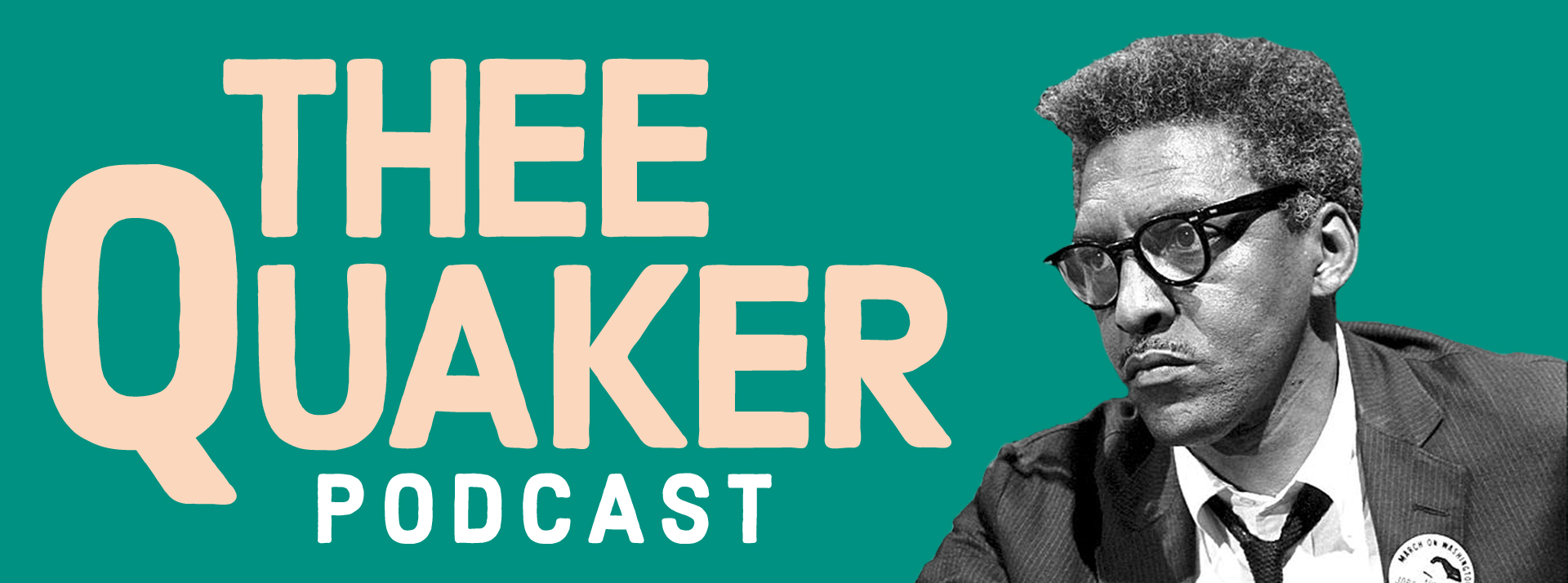

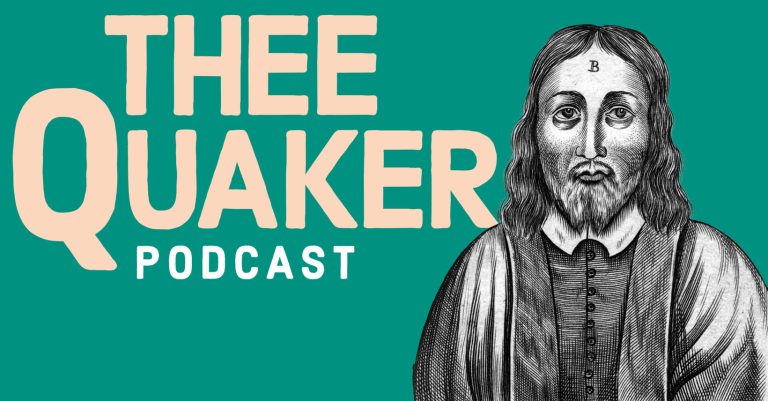
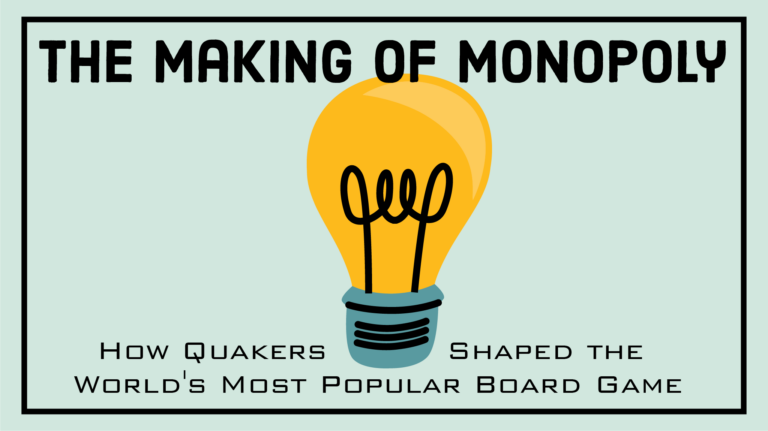
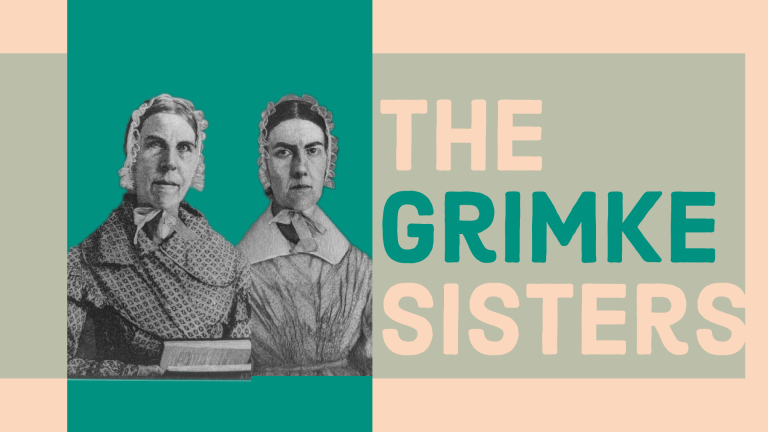

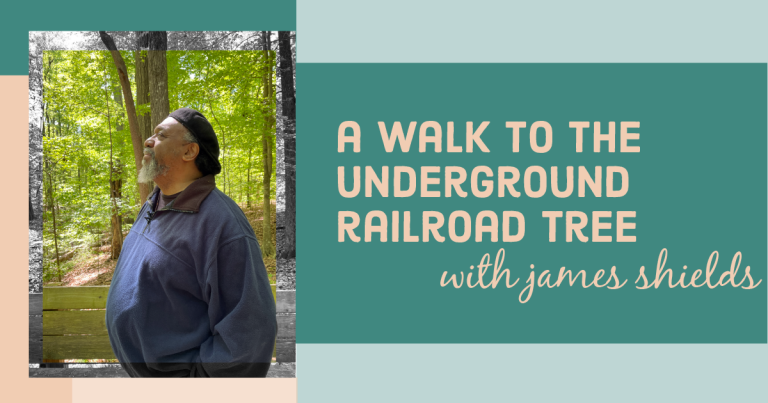
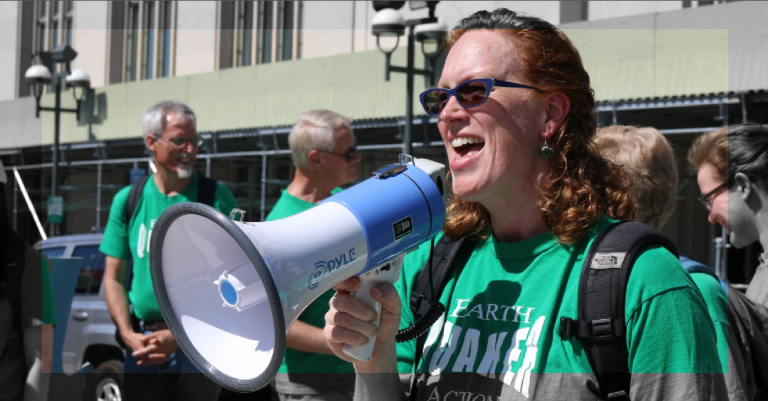
Thank you so much for this episode about James Nayler. I really enjoy learning about early Friends — and other outstanding Friends from any era.
In teaching at a Quaker school I grew to appreciate Quaker values and have been attending MFW for over 15 years now, mostly with a small group of plain, conservative (Christ-centered), non-programmed Friends.
In gratitude and appreciation to you for creating and making this podcast available,
Jesse K
Can we get a transcript. Podcasts are an effective way for me to absorb information
Hi Dennis! Thanks for listening. Yes, there is a downloadable transcript of every episode located below the audio player. Just click the word “transcript” right next to the word “overview”.
I am curious to know about Nayler’s phrase, “ “It takes its kingdom with entreaty and not with contention, and keeps it by lowliness of mind.” What did he mean by “lowness of mind”? It is reminiscent of Lao Tzu’s writing,
“all streams flow to the sea because it is lower than they are. humility gives it its power. if you want to govern the people, you must place yourself below them. if you want to lead the people, you must learn how to follow them.” I should mention that I am a writer and may wish to cite Nayler’s words, depending upon the interpretation you may be able to provide to me. Thank you.
Hi Tom! Great question. I understand it to mean maintaining a posture of humility in your thoughts, and of course, thoughts lead to actions. Also, this article by Patricia McBee might be helpful: https://www.friendsjournal.org/quaker-spiritual-disciplines-hard-times/